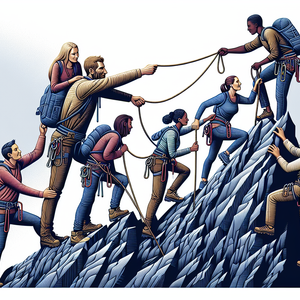The Impact of Remote Work on Full Stack Developer Salaries

One of the most notable impacts of remote work on salaries is the geographical disparity that has emerged. Traditionally, full stack developers in tech hubs like San Francisco or New York commanded higher salaries due to the high cost of living and intense competition for talent. A survey conducted by Glassdoor indicated that the average salary for a full stack developer in San Francisco can exceed $130,000 annually, while in less expensive cities like Austin, the average hovers around $100,000. However, with remote work becoming the norm, many companies are now offering salaries based on the national average rather than local market rates. This shift has allowed developers in lower-cost areas to compete for positions that were once reserved for those in high-cost regions. For instance, an experienced developer in the Midwest can now apply for roles that previously targeted coastal talent, often without a significant salary penalty. According to a survey by Stack Overflow, 47% of developers reported that they would consider relocating for a remote job, indicating a shift in how developers view salary relative to their living conditions.
Benefits of Remote Positions
Remote work offers a plethora of benefits that can enhance overall job satisfaction, which in turn affects salary negotiations. Full stack developers working remotely often enjoy a better work-life balance, reduced commuting costs, and the flexibility to create their own work environments. These perks can make a slightly lower salary more acceptable, as developers prioritize lifestyle over pure financial compensation. For instance, a developer might accept a remote position with a salary of $90,000, which is lower than the $110,000 offered in a traditional office environment, but the developer saves significantly on commuting costs and enjoys more personal time. This is corroborated by Buffer's report, which indicated that 98% of remote workers would like to work remotely at least some of the time for the rest of their careers. The demand for flexibility has prompted companies to rethink their compensation packages, often including additional perks such as home office stipends or flexible hours, which can improve job satisfaction without directly increasing base salaries.
Global Labor Market Adjustments
As remote work opens the door to a global talent pool, companies are adjusting their pay scales to remain competitive. This shift has created a scenario where full stack developers from countries with lower living costs can apply for and secure jobs with companies based in wealthier nations. For example, a skilled developer in Eastern Europe or Southeast Asia might accept a salary that is significantly lower than their Western counterparts but still higher than local market rates. A developer from Poland might earn $50,000 working for a U.S.-based company, which is a substantial income in Poland but represents a cost-saving for the employer. This has led to an influx of talent in the global market, pushing companies to offer competitive salaries that reflect the skills and expertise of these developers rather than solely their geographical location.
The impact of remote work on full stack developer salaries is profound and multifaceted. As geographical boundaries dissolve, salary expectations are evolving, creating opportunities for developers across diverse locations. While some may experience a decrease in local salary benchmarks, the overall benefits of remote work — such as flexibility, work-life balance, and job satisfaction — are reshaping how developers view compensation. As the tech industry continues to adapt to these changes, understanding the nuances of remote work will be crucial for both developers and employers navigating this new landscape. Ultimately, the rise of remote work is democratizing the tech job market, allowing talent from anywhere to thrive in the world of full stack development.
Remote Full Stack Developer
Tech startups, e-commerce companies, and SaaS providers
Core Responsibilities
Design and implement end-to-end web applications, integrating front-end and back-end components.
Collaborate with UX/UI designers to create user-friendly interfaces and improve user experience.
Maintain and enhance existing software applications, ensuring optimal performance and security.
Required Skills
Proficiency in programming languages such as JavaScript, Python, and Ruby.
Experience with frameworks like React, Node.js, and Django.
Familiarity with cloud services (e.g., AWS, Azure) and version control systems (e.g., Git).
Remote DevOps Engineer
Large tech firms, cloud service providers, and enterprises seeking digital transformation
Core Responsibilities
Automate and streamline operations and processes, improving overall software delivery.
Monitor and maintain cloud infrastructure, ensuring high availability and scalability.
Collaborate with development teams to integrate CI/CD pipelines for efficient deployment.
Required Skills
Strong knowledge of containerization tools (e.g., Docker, Kubernetes) and configuration management (e.g., Ansible, Terraform).
Experience with scripting languages like Bash or Python.
Familiarity with monitoring tools (e.g., Prometheus, Grafana) and cloud platforms (AWS, GCP).
Remote UI/UX Designer
Digital agencies, product-based companies, and startups focused on user experience
Core Responsibilities
Conduct user research and usability testing to gather insights and inform design decisions.
Create wireframes, prototypes, and high-fidelity mockups for web and mobile applications.
Collaborate with developers to ensure design feasibility and adherence to best practices.
Required Skills
Proficiency in design tools such as Adobe XD, Figma, and Sketch.
Strong understanding of user-centered design principles and responsive design.
Ability to communicate design concepts effectively to stakeholders.
Remote Software Quality Assurance (QA) Engineer
Software development firms, financial institutions, and e-commerce companies
Core Responsibilities
Develop and execute test plans, test cases, and automated tests to ensure software quality.
Identify, document, and track defects while collaborating with development teams for resolution.
Perform regression testing and participate in code reviews to maintain high standards.
Required Skills
Familiarity with testing frameworks and tools (e.g., Selenium, JUnit).
Understanding of software development life cycles (SDLC) and agile methodologies.
Strong analytical skills and attention to detail for effective bug detection.
Remote Data Analyst
Marketing agencies, tech companies, and research organizations
Core Responsibilities
Collect, process, and analyze large data sets to derive actionable insights for business decisions.
Create data visualizations and reports to present findings to non-technical stakeholders.
Collaborate with cross-functional teams to define metrics and KPIs for performance tracking.
Required Skills
Proficiency in data analysis tools (e.g., SQL, Python, R) and visualization software (e.g., Tableau, Power BI).
Strong statistical knowledge and experience with data modeling techniques.
Excellent communication skills to convey complex data in a clear and concise manner.


